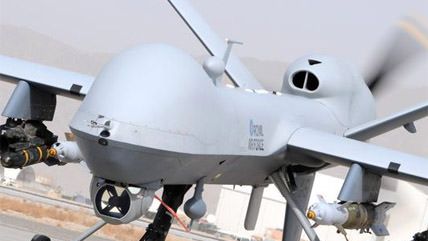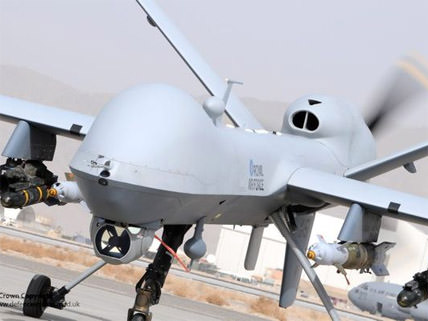Border Agency "Discovered" That It Lent Predator Drones Almost 200 More Times Than Previously Disclosed


The Customs and Border Protection agency (CBP) claims that it recently "discovered" that it in three year period, it lent out predator drones to other agencies for domestic use on nearly 200 more occasions than it previously acknowledged.
The CBP didn't divulge this surprising information unprovoked. The Electronic Frontier Foundation (EFF) has been slowly wrangling data out of the Department of Homeland Security (DHS), which oversees the CBP, through a Freedom of Information Request (FOIA) lawsuit since 2012.
When the agency made its initial release in September 2013, the content was alarming enough. The documents revealed that federal, state, and local agencies borrowed drones 498 times from 2010 through 2012. Various military branches, the FBI, Bureau of Indian Affairs, North Dakota Narcotics Task Force, Minnesota Bureau of Criminal Investigations, and numerous unnamed county sheriff's offices were among the recipients. The FOIA document also contradicted information the federal government made available to the public. The Department of Justice issued a report that, as of May 2013, it only utilized CBP drones twice. The EFF reports that the "CBP flew its drones over 100 times just for Department of Justice components including FBI, DEA and US Marshals."
Conveniently, the agency forgot about an enormous chunk of data until "the eve of the pivotal court hearing on those motions in December 2013," the EFF explains. The CBP actually lent drones a total of 687 times, not 498. Also, a wide range of agencies have been added to the list of recipients. This includes the Federal Aviation Administration, Arizona Department of Public Safety, and a mysteriously titled "Local PD Officer." The EFF notes that the CBP's latest announcement "reveal[s] a sharp increase in the number of flights for certain federal agencies like ICE (53 more flights than previously revealed) and the Drug Enforcement Agency (20 more flights)."
On top of the red flags of the CBP's tricky behavior, the lack of consistent information reported across agencies, and the militarization of domestic police forces, the FOIA data highlights another problem with the drone borrowing program. As Tim Cushing of Techdirt points out "borrowing a drone indicates the agency likely doesn't already have one -- which also indicates it doesn't have anything in place to govern its use or disposal of unneeded or incidental data." This lack of institutional checks opens up the real possibility that these various government outfits could continue to abuse their ability to collect and access data, not just on people near the southern border, but virtually anywhere in the country.


Show Comments (12)